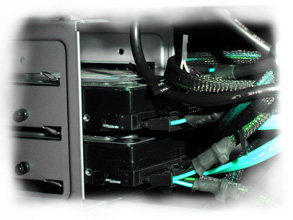5 reasons why to host – and not to host – your own web site
 The Internet is huge, and as a result more and more people are getting their own domains and places on the web. One question to ask before subscribing to a hosting plan is: should I host this site myself?
The Internet is huge, and as a result more and more people are getting their own domains and places on the web. One question to ask before subscribing to a hosting plan is: should I host this site myself?
In this post I’ll give you five pros and five cons why to – and not to – host your own web site.
Pros:
First of all, it’s cheap. You can host it on the computer you are using right now to read this, so there is a $0 investment. Although we can do it on our main machine, most people have an old computer somewhere (budget don’t last for more than six years anyway), which might work just fine.
You get full control over your site. With a webhost you’ll have to conform to the possible restrictions as well as not being able to configure things as you’d like to have them. For simple users this might not be an issue, but medium to advanced users might have troubles.
You are able to do much more than simply delivering web pages, such as executing code or running shell scripts. On a Linux server you could use regular scripts to take care of uploaded files easily (I find bash easier than PHP when it comes to handling files), and to take regular and automated backups.
The content is stored on your machine in your house, meaning that no-one else will have unpermitted access to it. It’s unlikely that a webhost will take a sneak peek into your files, but if it’s sensitive data you’d better not risk it.
Bandwidth and storage is virtually unlimited. Almost all webhosts limit the storage and the bandwidth that you’re allowed to consume each month. If you have 10Gb/month, it’s equal to 4kb/s (32kbit/s)… which is not very much. Disk space is often limited to around 5Gb, and a home server might have a 40Gb disk installed and is easily upgraded to a half a terabyte (500Gb) for a low cost.
Cons:
Using an old device might result in high power consumption and the need to upgrade or replace hardware such as the hard disk, removing any money you could save (or even cost more!). If your spare time are scarce you might not want to invest a few hours (depending on your current skill level) to get things working. It might be “worth” subscribing to a real host.
You might wrongly configure the server settings leading to security holes. This might expose all of your files and/or allow malicious users to take control of the computer. If your network is not properly configured the server could be used to spread viruses within the network. Of course, this is not likely – use the default configuration and follow an apache guide and search for some security walkthroughs and you should be fine.
The bandwidth used “on average” might be low for 10Gb per month, but load may vary depending on who visits your site and how many visitors you got. My peak of activity is around 22-03 hours GMT, and I get a lot of visitors from the US. My download is around 2Mb/s and my upload is 120kb/s (bytes, not bits). With this it would take 3 seconds to transfer a page on 360kb and 25 seconds to transfer a 3Mb image. Do you have enough hardware to satisfy a few hundred users?
Uptime is important. A webhost might have 99,99% availability with very few interruptions and back-end technology in order to prevent server failures and keep availability up in case of a server crash (such as having multiple servers with the same content). My home router crashes about every week and it also crashes whenever the load becomes too much for it to handle. If you get a software error when you are asleep you might not detect it until 8-12 hours later, giving you a very bad uptime.
Unlimited disk storage can also be a bad thing. For one, I have 3Gb on my webhost and I will never reach that limit. You simply don’t need more than 3Gb for a site that does not handle massive amounts of media – just like you don’t need a phone with more than 16Gb storage (yes, I’m looking at you – iPod Touch users!). However, the real downside of unlimited storage is the mindset – you can waste storage space. You only irritate yourself and your users by wasting space since storage conservation always leads to smaller pages, less bandwidth usage and faster load times.
Bottom line
You will save money in the long run, but perhaps not right away – and you will most certainly not save time. If you need to have high availability and support you should sigh up with a webhost. If you expect to get huge loads (such as 200.000 users in a day) you should also sign up with a webhost.
However if you are hosting a normal site and don’t mind the configuration you might be better off by hosting it yourself. If you feel like it’s too much to handle you could always buy a hosting plan and redirect your domain.